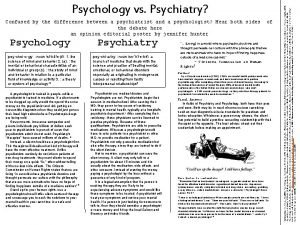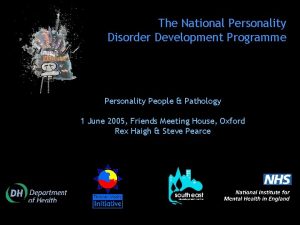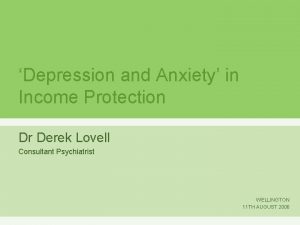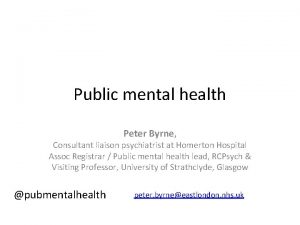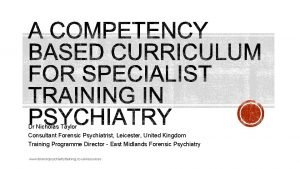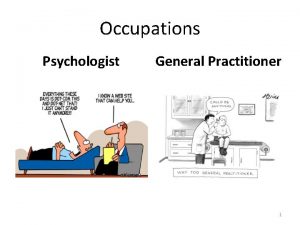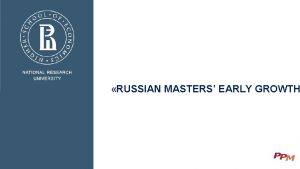Psychologist vs Psychiatrist w Psychologist w Masters 2






















- Slides: 22

Psychologist vs Psychiatrist w Psychologist w Masters (2 yrs) w Doctoral (3 -5 years) Ph. D or Psy. D (clinical) Cannot prescribe drugs Practitioners Academic Researchers w w w w Psychiatrist Medical Doctor M. D. Medical school with internship in psychiatry Can prescribe drugs Counselor Master’s degree (MSW or MC) Less severe mental health problems Family, relationship, substance abuse, anxiety

Types of Psychologists w w w Clinical. Counseling Social Experimental Physiological/neurological Cognitive Developmental Psychometrics Industrial/Organizational Education/school Forensic


Careers in Psychology: Percentage of Psychology Degrees by Specialty

1909 - Clark University Psychology Convention w C: Documents and SettingsREEDSDesktopimages. jpg

Defining Psychology Defined-The study of behavior and mental processes w Goals of Psychology w • To fulfill a genuine curiosity about behavior • To understand the contributions of genetics and environment (social and cultural) in behavior and mental process • To study behavior using methods that deem the study scientific

Roots of Psychology in Philosophy w w w Psyche (life/self) logos (logic) Plato (400 BC)- Rationalism, deductive reasoning Aristotle- Associations Descartes- Dualism- Mind and Body, Nativism John Locke- Empiricism, tabula rasa

The Roots of Psychology and science In the late 1800’s both physiologists and philosophers will be investigating the mind w Philosophy- “Why? ” w Physiology_ “How? ” w

Psychology-A scientific discipline w Wilhelm Wundt (1832 -1920) • Works to have psychology become an independent science • Founds the 1 st psychology laboratory in Germany (1879)

Competing Schools of Thought That Shape Psychology w Structuralism • Wundt and Titchener Structuralism focused on the structure of consciousness • Premise-The content of conscious experience can be analyzed into its basic elements

Psychology Comes to America w G. Stanley Hall (1846 -1924) • A student of Wundt • Establishes 1 st American laboratory at Johns Hopkins (1883) • Founded 1 st American psy journal (1887) • Founded American Psychological Association. APA (1892)

Woman and minorities Few woman and minorities in early 1900’s Woman w Margaret Floy Washburn- first Ph. D 1894 w Mary Calkins- first president of APA w Currently woman get about 70% of Ph. D’s African American Francis Sumner- first Ph. D in 1920 w

Competing Schools of Thought That Shape Psychology w Functionalism • William James and G. Stanley Hall were the primary proponents • Interested in studying the functions of consciousness • Premise-the function of a conscious experience in providing adaptation of the organism is more important than the structure of that conscious experience

Current Perspectives w w w Psychoanalytic Behavioral Cognitive Biological Humanistic Others evolutionary, sociocultural,

Current Perspectives in Psychology

Psychoanalytic early 1900 s (Freud) Freud- Interpretations of Dreams (1900) w Behavior influenced by unconscious processes w Stressed early childhood experiences determine later behavior w Negative view of humanity (aggression, sex)

Early behaviorists Pavlov (1913)- Dog • Watson (1925)- Little Albert • Skinner- Box, rewards and punishments

Behaviorists (Skinner, Watson, Pavlov) Environment determines behavior (Clean slate) w Stimulus Response w Reinforcements and punishment w Studies observable (overt) behavior and stimuli, not concerned with internal states w

Humanistic w w w Emerged as a revolt against behaviorism and psychoanalytic approaches Carl Rogers founder Inherent Goodness of Human Beings FREE WILL Unconditional Positive Regard

Cognitive Thoughts and mental processes w Stim Mental process Behav w Rational emotive therapy w

Biological Observable behavior given physiological explanations w Genetics, biochemical, neurological w

Seven Themes of Psychology w w w w Psychology is Empirical Psychology is theoretically diverse Psychology evolves in a sociohistoric Behavior has multiple causes Behavior is shaped by cultural heritage Behavior is influenced by heredity and environment Our experience of the world is highly subjective
 Psychologist vs psychiatrist
Psychologist vs psychiatrist Professor shanaya rathod
Professor shanaya rathod Dr moghul
Dr moghul Dr john hillery psychiatrist
Dr john hillery psychiatrist Steve pearce psychiatrist
Steve pearce psychiatrist Dr derek lovell psychiatrist
Dr derek lovell psychiatrist Broadmoor inmates
Broadmoor inmates Donna grant psychiatrist
Donna grant psychiatrist Dr fionnuala o'loughlin psychiatrist
Dr fionnuala o'loughlin psychiatrist Expert in consultant liaison psychiatrist
Expert in consultant liaison psychiatrist Dr hoosen psychiatrist
Dr hoosen psychiatrist Dr simon howard psychiatrist
Dr simon howard psychiatrist Dr rebecca lawrence psychiatrist
Dr rebecca lawrence psychiatrist Babor
Babor Shahid hussain psychiatrist
Shahid hussain psychiatrist David ash psychiatrist
David ash psychiatrist Difficulty scale
Difficulty scale Consultant forensic psychiatrist
Consultant forensic psychiatrist Sean hood psychiatrist
Sean hood psychiatrist Dr marinda joubert
Dr marinda joubert Slaves obey your earthly masters
Slaves obey your earthly masters Sindrom masters allen
Sindrom masters allen Tablić masters
Tablić masters
